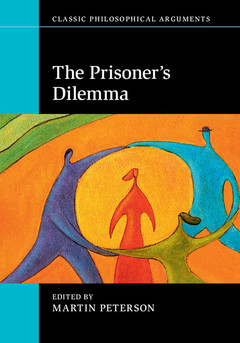Description
The Prisoner's Dilemma
Classic Philosophical Arguments Series
Coordinator: Peterson Martin
This volume examines the Prisoner's Dilemma, exploring its continued significance and ramifications in varying fields of study.
Language: English
Subject for The Prisoner's Dilemma:
The Prisoner's Dilemma
Publication date: 07-2015
306 p. · 17.5x24.6 cm · Paperback
Publication date: 07-2015
306 p. · 17.5x24.6 cm · Paperback
The Prisoner's Dilemma
Publication date: 07-2015
306 p. · 17.9x25.3 cm · Hardback
Publication date: 07-2015
306 p. · 17.9x25.3 cm · Hardback
Description
/li>Contents
/li>Biography
/li>
The Prisoner's Dilemma is one of the most fiercely debated thought experiments in philosophy and the social sciences, presenting the simple insight that when two or more agents interact, the actions that most benefit each individual may not benefit the group. The fact that when you do what is best for you, and I do what is best for me, we end up in a situation that is worse for both of us makes the Prisoner's Dilemma relevant to a broad range of everyday phenomena. This volume of new essays from leading philosophers, game theorists, and economists examines the ramifications of the Prisoner's Dilemma, the directions in which it continues to lead us, and its links to a variety of topics in philosophy, political science, social science, economics, and evolutionary biology. The volume will be a vital and accessible resource for upper-level students as well as for academic researchers.
Introduction Martin Peterson; 1. Why all the fuss? The many aspects of the Prisoner's Dilemma Ken Binmore; 2. How I learned to stop worrying and love the Prisoner's Dilemma David Gauthier; 3. Taking the Prisoner's Dilemma seriously: what can we learn from a trivial game? Daniel M. Hausman; 4. Prisoner's Dilemma doesn't explain much Robert Northcott and Anna Alexandrova; 5. The Prisoner's Dilemma and the coevolution of descriptive and predictive dispositions Jeffrey A. Barrett; 6. I cannot cheat on you after we talk Cristina Bicchieri and Alessandro Sontuoso; 7. Prisoner's Dilemma cannot be a Newcomb Problem José Luis Bermúdez; 8. Counterfactuals and the Prisoner's Dilemma Giacomo Bonanno; 9. The Tragedy of the Commons as a Voting Game Luc Bovens; 10. The role of numbers in Prisoner's Dilemmas and public good situations Geoffrey Brennan and Michael Brooks; 11. The inner struggle: why you should cooperate with people you will never meet again Martin Peterson; 12. Prisoner's Dilemmas, intergenerational asymmetry, and climate change ethics Douglas MacLean; 13. Prisoner's Dilemma experiments Charles Holt, Cathleen Johnson and David Schmidtz; 14. The lesson of the Prisoner's Dilemma Paul Weirich; Bibliography; Index.
Martin Peterson is Sue and Harry E. Bovay Professor in the Department of Philosophy at Texas A & M University. His recent publications include Non-Bayesian Decision Theory (2008), An Introduction to Decision Theory (Cambridge, 2009) and The Dimensions of Consequentialism (Cambridge, 2013).
© 2024 LAVOISIER S.A.S.
These books may interest you

Evolution of the Social Contract 20.18 €

Evolution of the Social Contract 80.98 €

